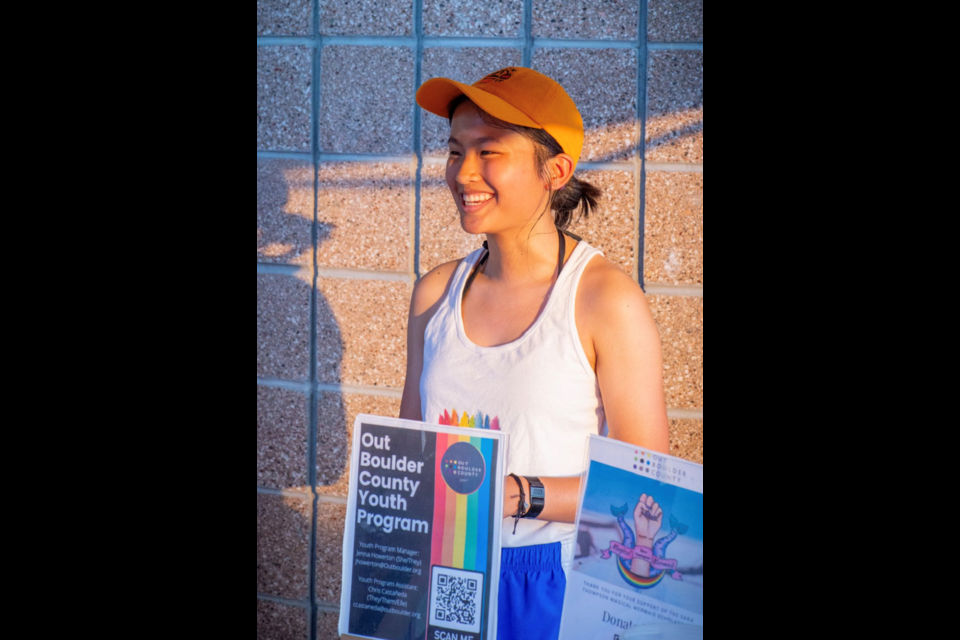Lily Berlin, a sophomore at Metropolitan State University in Denver, never really felt like she fit in. She identifies as an LGBTQ+ Asian American and said she never had a queer community throughout high school. At times she has struggled with feelings of loneliness and knows, firsthand, the importance of community. Now she is in a place to create it for others.
High school was lonely for Berlin who said she didn’t have many queer friends. She sought a community and found support through Out Boulder County’s youth program.
Berlin explored joining Out Boulder County — a nonprofit organization dedicated to helping members of the LGBTQ+ community thrive through connection, advocacy, education, research and programs — she attended a youth event at the Denver Museum of Nature and Science.
After the event, the youth group director, Jenna Howerton, asked her if she wanted to join the group. Berlin agreed, thinking she might make a few friends and find a place to fit in.
Little did she know that a few short years later she would work for the nonprofit as a youth program assistant. Today, Berlin assists Howerton with youth group activities by supporting its social media pages, doing outreach and even planning a few events of her own, including the first OTPOC Youth Leadership retreat.
“It’s an organization that has incredible values and the support that they give their youth is just incredible. It really helped me out through high school,” Berlin said. “Now that I am in this position of leadership, as a youth who went through their youth program, I’m able to give insight.”
Berlin’s leadership is key in many youth programs from camps to intern mentorship. However, one of most impactful areas she is involved in is the QTPOC Youth Leadership.
QTPOC stands for Queer, Trans People of Color. The youth leadership group works on basic leadership skills though different trainings. The group also chooses one area of the community it wants to see change and works toward those goals, Berlin said.
The current project is promoting more LGBTQ+ inclusive education in schools, especially that which also includes people of color.
The group also recognized that homophobia is prominent in cultures of color and is toying with the idea of creating an ethnic cooking class. The hope is that the classes will open dialogue among families.
In the end though, Berlin’s hope is to support a new generation of LGBTQ leaders as they find their voice and make change.
“I think in the sort of community that we live in, there’s not that many LGBTQ figureheads to look up to ... Many youth just want to get involved and serve their community,” Berlin said. “... representation for leaders who look like them and are like them, even in movies and TV shows. White, cisgendered, heterosexual people get to see themselves in movies and TV shows all the time, so they don’t experience that. But a person who is queer, trans or a person of color just don’t see themselves represented and I think that representation is really, really important.”
Berlin said that representation has a big impact on how these young leaders are looked at and respected as they make change within their community.
“Many Asian Americans and other people of color often struggle with their racial and ethnic identity development — with many citing how a lack of media representation negatively impacts their self-esteem and overall views of their racial or cultural groups,” said Kevin Leo Yabut Nadal Ph.D. in an article on why representation matters published on the Psychology Today website. “Scholars and community leaders have declared mottos like how it's "hard to be what you can’t see," asserting that people from marginalized groups do not pursue career or academic opportunities when they are not exposed to such possibilities.”
“Representation can serve as opportunities for minoritized people to find community support and validation,” Nadal added.
Berlin is undecided exactly what she wants to do after graduation, however, she plans to continue working with OBC youth. She hopes to continue to create an environment where young people feel supported.
“A lot of youth don’t live in affirming households or go to very affirming schools … a lot of the time their outlet or community of friends is through youth groups and through our programming. One of my goals for them is that they are supported and that they are cared for and that we are here to support them,” Berlin said.



